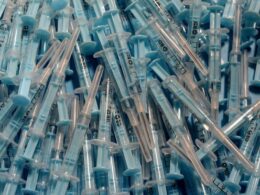The government is aiming to secure homegrown supplies of the mRNA technology that has proved a crucial weapon in the fight against Covid-19 and offers the prospect of transforming treatment for other conditions such as cancer.
This is a republication of the article “UK signs £1bn deal with Moderna for new vaccine centre”, with the title above.
Financial Times
June 22, 2022
Edited by
Joaquim Cardoso MSc.
Health Transformation . Foundation
Pandemics Response Strategy Institute
Vaccines Strategy Unit
June 22, 2022
The UK government is collaborating with Boston-based Moderna to build the country’s first manufacturing centre for messenger RNA vaccines in a deal worth £1bn as it seeks to be a leader in responding to pandemics.
The government is aiming to secure homegrown supplies of the mRNA technology that has proved a crucial weapon in the fight against Covid-19 and offers the prospect of transforming treatment for other conditions such as cancer.
The government is aiming to secure homegrown supplies of the mRNA technology that has proved a crucial weapon in the fight against Covid-19 and offers the prospect of transforming treatment for other conditions such as cancer.
Once built, the centre — which could be located anywhere from the “Golden Triangle” between London, Oxford and Cambridge in the south of England to a site in the North-East — will manufacture up to 250mn doses per year, including some for export.
The 10-year deal, which will be finalised this summer, also includes working together on research and development.
Sajid Javid, health secretary, said the government had drawn Moderna with a long-term supply agreement for vaccines as well as the UK’s strong life sciences ecosystem.
“This is huge in scale and capability,” he told the Financial Times. “I think what this shows is that in post-Brexit Britain, when it comes to inward investment, and particularly in this case, the life sciences, the UK is the leader in Europe.”
Javid had sought and secured “a personal mandate” from Boris Johnson, UK prime minister, to negotiate the deal, he added. He visited Moderna earlier this year.
In 2020, the government bet heavily on the vaccine developed by AstraZeneca in partnership with Oxford university, which never achieved the efficacy levels of the mRNA jabs.
Johnson said the investment with Moderna would “guarantee jabs in the arms” and create jobs, as the Boston-based biotech develops vaccines for other respiratory diseases including flu and respiratory syncytial virus.
“We’ve all seen what vaccines can do, and today’s partnership brings us one step closer to finding cures for some of the most devastating diseases,” he said.
The agreement in principle includes setting up domestic manufacturing of mRNA vaccines, which can rapidly be adapted to address outbreaks of novel pathogens.
The Covid-19 pandemic highlighted the importance of homegrown supply of vaccines, as governments including the US and India restricted their exports.
The Covid-19 pandemic highlighted the importance of homegrown supply of vaccines, as governments including the US and India restricted their exports.
The UK said it had invested £395mn in securing and scaling up the country’s drug manufacturing capabilities since the start of the pandemic.
But it has also sold part of its flagship vaccine manufacturing centre.
Javid made clear that the government viewed the investment as a critical part of its post-Brexit life sciences strategy. Under the deal, Moderna will conduct a large proportion of its clinical trials in the UK.
Ministers regard the cradle-to-grave patient records generated by the taxpayer-funded NHS, which cares for Britons throughout their lives, as a significant incentive for companies to invest in the country.
Stéphane Bancel, Moderna’s chief executive, said people had been worried after Brexit that the UK would suffer from less investment in science.
But he said Moderna was helping address those concerns by bringing the mRNA technology, which can also be used by other scientists to create something “super magic”.
“The piece that was very exciting to us is the incredible amount of scientific leadership that the UK has had for a long time . . . this is not something the UK has lost at all,” he said.
He added that with 46 programmes for potential drugs or vaccines in its pipeline, Moderna could not do all its clinical trials in the US. “The scale that the UK has to offer in terms of clinical trial capability is quite unique,” he said.
He added that with 46 programmes for potential drugs or vaccines in its pipeline, Moderna could not do all its clinical trials in the US. “The scale that the UK has to offer in terms of clinical trial capability is quite unique,” he said.
Moderna will also build a facility to allow university researchers access to its mRNA platform.
Javid said one of the lessons of the pandemic was making sure the country was more resilient. “There will be future pandemics,” he said. “None of us knows exactly what, when and how.”
Originally published at https://www.ft.com on June 21, 2022.
Names mentioned
Sajid Javid, health secretary
Moderna
Stéphane Bancel, Moderna’s chief executive












